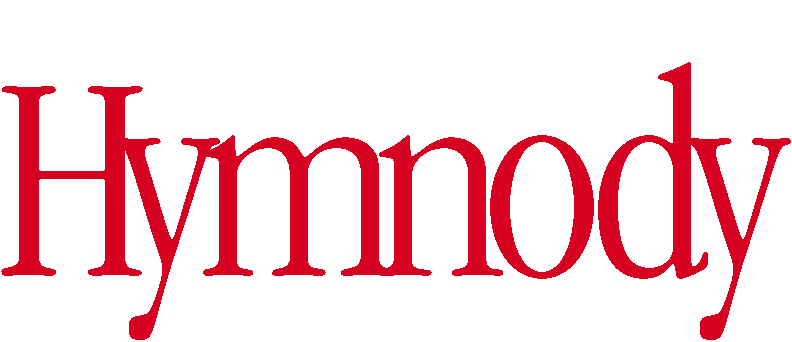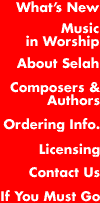|
|
 |
New Songs of Rejoicing
Hymnal Supplement
Editor David P. Schaap
Released June 1994
Catalog no. 125-010 (Soft-cover, 224 pages. Complete indexes.) 125-011 (Spiral-bound)
ISBN 0-9622553-9-4 (Soft-cover)
Price $17.50 (U.S.-Soft-cover)
Order Soft-cover now


$25 (U.S.-Spiral)
Order Spiral now


Description
Here are the best new hymns and songs for all the church seasons, communion, funerals, children, and hymns appropriate for almost every service. We spent a great deal of time looking for the best new hymns written since Songs of Rejoicing was published in 1989. New Songs of Rejoicing is a complete supplement of the best new hymns by the best composers and poets.
Reviews
"This book is a successor to Songs of Rejoicing (1989), reviewed by Michael Garland in Bulletin 183 (April 1990). Like that earlier collection this is neither a primary hymnal nor a supplement to any particular book; rather it is an anthology of 171 pieces which, in words or music or both, have not previously appeared in a mainstream hymnal. True, a fair proportion have been printed in the various one-author or one-composer collections that the Selah company has published. But to most readers all but a handful of either texts or tunes will be unfamiliar.
Of course, given that the field drawn upon is what the Selah company has, so to speak, in stock, this collection may not be entirely representative of new American hymnody, even of the serious kind. Nevertheless, the material covers a wide range as is clear from the very detailed indexes of topics and scripture references.
Just two or three pieces perhaps approach the fuzzy dividing-line between hymns and worship songs, but nothing here could be put unhesitatingly in the song category. There are, in addition to eleven psalm paraphrases, six prose psalms set, Gelineau-style, with anthiphons. Everything else, however, is no-nonsense hymnody. The contents are classified as Hymns for the Church Year (Advent to Pentecost), Biblical Songs (i.e. settings of psalms and other scripture passages), Hymns for the Church in the World, and Hymns for the Church at Worship.
Among the authors the major contributors are Rae Whitney (26 texts), Carl P. Daw, Jr. (18), Gracia Grindal (11) and, from this side of the ocean, James Quinn (15). Brian Wren and Jaroslav Vajda provide five apiece. There are certainly some striking texts and it is difficult to resist the temptation to quote from them at length. James Quinn's paraphrase of the Venite and Joy Patterson's of Ps. 130 come high on the list of psalm versions; 'The house of faith has many rooms' well demonstrates Carl Daw's talent for straightforward yet not banal writing. There is an unusual but effective hymn by Richard Leach about laughter: 'Old Abraham fell down and laughed to hear that he would have a son Come, Lord of laughter, make us laugh, with promises we can't believe.' Laughter also comes into Rae Whitney's 'Music and incense, dancing and laughter, welcome each sinner,' on a page facing her moving piece 'Into our loneliness come now, dear Savior.' Two items are overtly feminist: Shirley Erena Murray's 'Of women and of women's hopes' would unfortunately sound convincing only from women's lips; less exclusive is Ruth Duck's 'We praise you, God, for women,' celebrating notable women of the past such as Hildegard of Bingen, yet the verse praising God for women priests might well raise hackles in some--not only male--quarters.
The Christmas season is now so over-stocked with hymns and carols that originality is hard to come by. A mock-medieval 'The babe in Beth'lem's manger laid' has plenty of 'Nowells' and semi-comic lines like 'Let every bosom hail the sound'' but James Quinn's 'Town of David, King and Shepherd,' particularly with Wilbur Held's tune, is splendid, as is Rae Whitney's 'That King, before whose majesty.'
The tunes mostly serve their purpose well enough, though not many show that extra something which anchors them in the memory. However, Alec Wyton's tune for Rae Whitney's 'Give with simplicity' has the spark; William Rowan provides a fine 8787 Trochaic (no. 66) and Mark Sedio's GOD'S LOVE is an excellent marching 11.10.11.10 for his own text.
Occasionally tune and text appear ill-matched. The slurs added to the Scottish tune KELVINGROVE to strap it to the Procrustean bed of 11.10.12.10 metre could, in Britain, be all but guaranteed to cause congregational chaos. Whether, for a nation yet to fix upon a standard setting of 'Rejoice, the Lord is King,' a tune in C minor will finally carry the day can be left for posterity to discover. Actually, little more than half the tunes are in major keys and three-quarters are set for unison singing--proportions that indicate different preferences on e two sides of the Atlantic. American folk melodies provide about a dozen of the settings.
For some writers rhyme does not seem a high priority. In one hymn, stanzas 1 and 2 have different rhyme schemes and then rhyme is abandoned altogether in stanzas 3 and 4. Does this matter? Not if it passes unnoticed. But a sensitive reader or singer may be aware of something amiss even if unable immediately to diagnose it. Whether a wholly blank verse is acceptable depends partly on tune and metre. James Quinn's paraphrase of the Benedictus, in blank verse and regular metre, is not well served here by FOREST GREEN because the tune, with its own musical rhymnes and repetition, draws attention to the absence of word-rhyme. (Yet how many Christmas carollers have realized that the asymmetrical 'O Come, all ye faithful' is blank verse?)
Carl Daw's keen concern for the language of worship is shown in
God not female, God not male,
God for whom all labels fail,
Truth beyond our verbal games,
Life too vast to bound with names. (128)
and still more imprssively in words that might well serve as motto for the whole collection(132)
This collection of eloquent and vital contemporary hymnody not only deserves the warmest commendation: it should be required reading for any hymnal editorial committee." --Bulletin 202 of The Hymn Society of Great Britain and Ireland, January 1995
"David P. Schaap has edited a volume of 171 contemporary hymns and psalms. Having enjoyed a hymn sing using this supplement, I can believe that many of these contemporary hymn tunes and hymns will find their way into new hymnals. Here you will find outstanding texts by Brokering, Daw, Duck, Dudley-Smith, Dunstan, Rusty Edwards, Fred Pratt Green, Gracia Grindal, Fred Kaan, James Quinn, Joy F. Patterson, and others. There are many fine new hymn tunes by Busarow, Fedak, Held, Hopp, Hopson, David W. Music, Rowan, Schulz-Widmar, Mark Sedio, Wayne L. Wold, and Carlton R. Young. Besides the usual indexes, there are lists of anthem settings of the hymns (published separately) and songs appropriate for children."--The American Organist, June 1996
"I love to get on my sopabox and loudly proclaim to anyone who will listen that while this may not be the golden age of anything else it may well be the golden age of hymn writing. David Schaap has compiled and edited a new hymnal that certainly helps to support my ranting.
There are 171 hymns representing 72 authors/sources and 62 composers/sources. The hymns run the gamut from Joseph Addison (1672-1719) to day-before-yesterday with the majority from the very recent past. Tunes are mostly new, with a few texts set to shaped-note tunes and even fewer to familiar old tunes such as J.B. Dykes's Melita.
Before hopefully producing a seventeen-minute state of grace by singing through all the hymns (in several sittings!) in the collection I went first to the Advent section--where I find a woeful lack of good hymns in most hymnals. Here I found some excellent texts and an introduction to a new writer whose work I very much admire: Rae Whitney, who is represented by 26 hymns in New Songs of Rejoicing. There are only seven hymns in the Advent section but this section represents for me the riches in this collection.
More stats: 42 'Hymns for the Church Year,' 33 'Biblical Songs' (including some psalm settings that seem curiously out of place), 65 'Hymns for the Church in the World,' and 31 'Hymns for the Church at Worship'--with each one of these sections divided into multiple sub-sections.
Tunes I found engaging and had not seen before included Alec Wyton's Ridgefield, Amanda Husberg's Michael Gideon Jacob, David Hurd's Nexus, and Ray Urwin's Kidder-which should give you an idea where my prejudices lie. There are other good tunes as well and you will want to make up your own mind as to which to use.
The indexes are copious and helpful, including a list of addresses for copyright holders, anthem settings of hymns (I suspect that these anthem settings were the prime source for the tunes in many cases), and hymns for children plus the usual scriptural, topical, authors/translators/sources, composers/arrangers/sources, metrical, tune names, and first lines and titles.
The publisher provides a form within the hymnal with instruction for obtaining a one-time license for the use of the hymns for which Selah controls the copyright--a much appreciated help.
Overall I find much to recommend. The singers in my parish don't mind mixing new texts with familiar tunes and we will undoubtedly use some of these wonderful hymns in that way." --The Hymn, April, 1996If you would like your comments on this publication to appear here, fill out our online review comments form.
Sign up our
|




